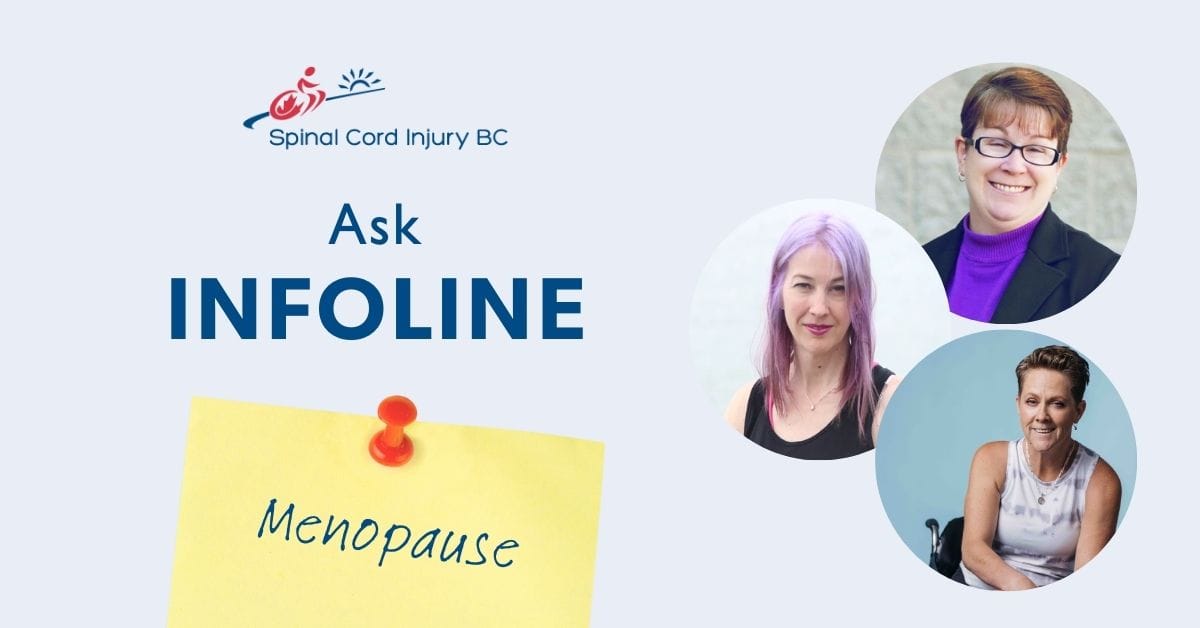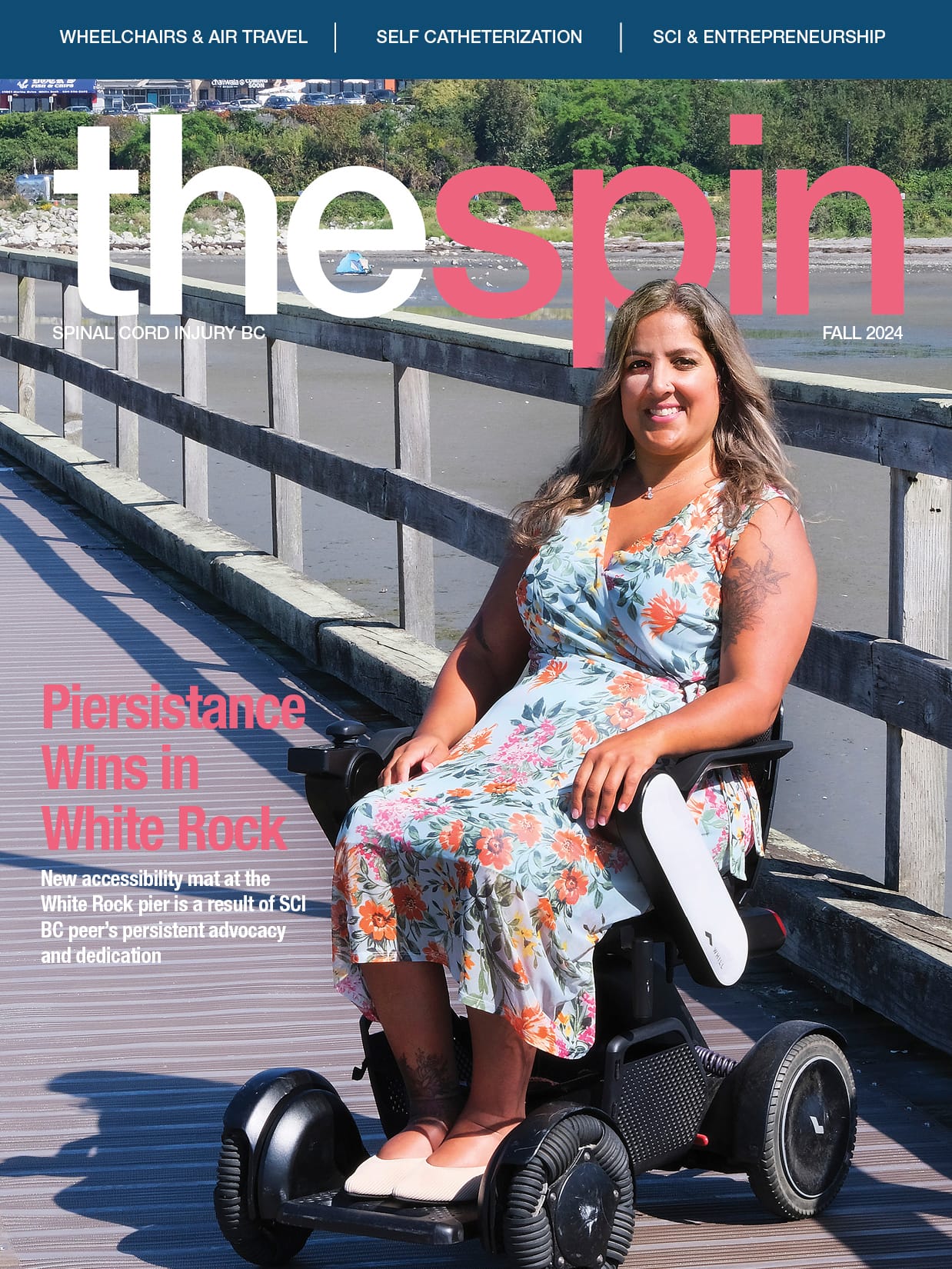
What I’m experiencing as I approach mid-life seems different from what my friends talk about. It feels like a merry-go-round—are my UTI and vaginal symptoms gynecological, urological, or neurological? My doctors are eager to blame perimenopause but nobody’s really certain what to do about it. How do I navigate this? —Deanna in Duncan
Questions about menopause are common these days on the InfoLine, and not a topic that most GPs are informed about in the SCI context. To answer this question, we looked to Life After Tampons, an online peer education series on menopause and SCI created by SCI BC and presented by Margaret Conquest, a tetraplegic peer and a health promotion advocate who brought together menopause research and peer experience on menopause to help peers equip themselves and their healthcare teams for the journey.
The menopausal transition (or perimenopause) is a time of decline in estrogen leading up to 12 months after a woman’s last period (menopause). For women with SCI, it can increase already vulnerable SCI health risks. “Symptoms I think that women with SCI should pay more attention to in mid-life include vasomotor symptoms (i.e., hot flashes) if you usually get autonomic dysreflexia (AD), Genitourinary Syndrome of Menopause (GSM), skin health, balance issues, body composition changes, cardiovascular health, and bone health.” Learning about how symptoms of perimenopause
affect women with SCI differently can help you work with your healthcare providers to figure out if treating menopause symptoms might help you.

Is it my neurogenic bladder or is it aging?
“It could also be GSM, one of the most underdiagnosed changes of menopause but I believe most impactful on women’s lives.” When estrogen declines, the vulva and vaginal structures that have the most estrogen receptors, such as the bladder, urinary tract, pelvic muscles, etc., don’t work as well. Pelvic floor muscles weaken and tissues get thinner, making it hard to hold urine or causing a more overactive bladder. These changes can also make penetration or routine contact to this area, such as for transfers, more sensitive or painful. It can be awkward to share, Conquest notes, but urges women not to ignore these symptoms. It’s important to review your bladder management with a urologist or continence nurse if the frequency of infections or leaks increases, and don’t be afraid to talk to your primary care doctor or a gynecologist about treatments, like topical or systemic estrogen, for the symptoms of GSM.
Changing body composition can affect mobility.
You may experience bigger shifts in body composition during menopause than your non-disabled friends: decreased muscle mass, weight gain, and heightened insulin resistance, posing unique risks for women with SCI. The big concern here for women with SCI is how these changes can affect transfers, mobility and wheelchair fit. Conquest emphasizes “simple, consistent, unsexy strategies” focusing on protein and fibre for diet change, and strength exercises to maintain mobility and independence—including daily tasks such as transfers, dressing, and bathing. Movement of any kind is beneficial, notes Conquest, and regular exercise also helps many menopausal symptoms like hot flashes, sleep, and stress. It can also help maintain bone, muscle, and heart health, which are all at increased risk related to both menopause and SCI. Consider trying a new activity or exercising with others for extra motivation.
Be open to changing how you do things.
Many women with SCI already experience fatigue and balance issues, which can worsen to the point that they may affect mobility or transfers. Reducing stress and improving your sleep routines is the most common advice, but also be open to changing your equipment: a power assist on your wheelchair or a lift in your vehicle are good ways to save your physical energy for other tasks. It’s okay to consider home support if you’re struggling! Declining bone density and drier, less resilient skin are also problems in perimenopause, so changes to make your transfers safer and easier can also help protect you from falls or injuries.
Is it me or is it AD?
Vasomotor symptoms (hot flashes or sweating) are well known during perimenopause but can be confusing if you are prone to AD. If you’re getting AD more often it might be due to menopause symptoms, including hot flashes! For some women, profuse sweating is also a symptom despite not being able to sweat for most of their post-SCI life. Conquest encourages women to discuss these symptoms with a doctor because of their profound impact on sleep and wellbeing.
As Conquest cautions, “there is no magic bullet for menopause,” and you need a personalized strategy for your situation and symptoms. Be patient with yourself as change can take time and it’s a lot to deal with at once. The good news? This transition will end, and most women report that mental health improves afterwards. Don’t tough it out or ignore it—see your doctor!
The InfoLine team is here to help, including finding accessible scales, adaptive equipment, funding supports, home support, and finding an OT for help to find the right equipment for safe transfers as your body changes.
To watch the Life After Tampons series videos and get an invite to our new bi-monthly Women Aging With SCI group starting in January 2025, check out www.sci-bc.ca/aging. SCI BC’s InfoLine provides information and support by phone or email on any topic relating to living with physical disabilities
in BC. Contact InfoLine at 1-800-689-2477 or info@sci-bc.ca.
This article was originally published in the Fall 2024 issue of The Spin. Read more stories from this issue, including:
- Peer advocacy
- Air travel
- Entrepreneurship
- A peer’s trip to Spain
And more!
Read the full Fall 2024 Issue of The Spin online!




